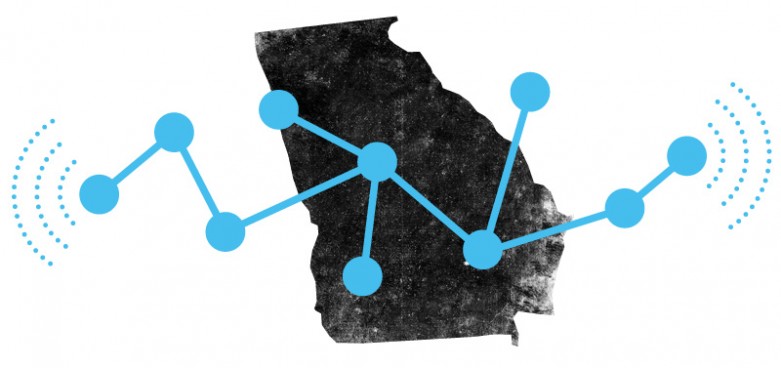
Georgia's Internet Uprising
The movement to connect more people to high-speed Internet services scored a win in Georgia last Thursday. It’s a victory that should resonate in every U.S. community that is struggling to give people better Internet access.
A coalition of Georgia mayors, counties and local activists overcame an industry-backed bill that would have prohibited municipalities from building their own broadband networks. The bill, HB 282, was defeated in a decisive bipartisan vote. The 94-70 tally marked the end of a string of legislative victories for those who seek to limit Internet choice to a few powerful companies.
Municipal broadband networks have been gaining traction across the country. It’s easy to see why: In many rural and low-income communities, privately offered broadband services are nonexistent. In its 2012 Broadband Progress Report, the Federal Communications Commission counted nearly 20 million Americans (the vast majority living in rural areas) beyond the reach of broadband.
The rise of homegrown Internet infrastructure has prompted the corporate-funded American Legislative Exchange Council (ALEC) to introduce state-level legislation designed to limit services to a handful of corporate network providers. ALEC, which receives financial support from AT&T, Comcast, Time Warner Cable and Verizon, has helped pass bills that hamper or outright ban municipal broadband networks in 19 states.
The legislators who sponsored the Georgia bill are major recipients of ALEC “scholarships.” Rep. Don Parsons is an active member of the ALEC Telecommunications and Information Technology Task Force. He has received $5,735.48 during his first three years in that role.
Bill sponsor Rep. Mark Hamilton received $3,527.80 in ALEC scholarships in 2008 alone, according to the Center for Media and Democracy. In the last cycle, Hamilton was on the receiving end of thousands in campaign contributions from AT&T, Charter Communications, Comcast and Verizon.
“To me this is a philosophical situation,” Hamilton said from the floor on Thursday as he tried to rally members to pass his legislation. “A vote ‘yes’ for this bill means that you support free markets and free enterprise.”
A ‘no’ vote, Hamilton argued, means that you want more federal dollars to prop up cities.
Hamilton’s private-enterprise argument is a common refrain among those opposing municipal networks. At its core is the belief that phone and cable companies do business without the assistance of U.S. taxpayers.
But other state legislators wondered whether these corporations are truly byproducts of a free market. “I do believe in the free market. I do believe in free enterprise, and I do believe in local control,” said Rep. Debbie Buckner, who opposed Hamilton’s bill. “They talk about [the companies] as if they are totally free market and free enterprise, but doesn’t AT&T get some tax breaks? Didn’t Windstream get some stimulus money? Isn’t that government money?”
Indeed, phone and cable companies have been on federal welfare since their inception. A 2011 Institute on Taxation and Economic Policy study shows AT&T and Verizon receiving more than $26 billion in tax subsidies from 2008–2010.
The FCC’s 2012 report on Universal Service Fund subsidies shows nearly $3 billion in federal payments to AT&T, Verizon and Windstream. In 2010, Windstream — a telecommunications company with services across the South — applied for $238 million in federal stimulus grants to improve its service in 16 states. More than 16 million taxpayer dollars went to upgrade the company's services in Georgia.
“Phone and cable companies would not be recording the soaring profit margins that they do, if there were truly a free market,’” said Free Press Research Director S. Derek Turner. “They have created an unlevel playing field that gives them massive first-mover advantages. The real-dollar benefits of that can’t be quantified.”
“The private companies have not been there for us,” said Rep. Buckner, who represents rural parts of Talbot and Meriwether Counties. “And if they say they’re going to come and be there for us, we don’t know how long it will take them to find us.”
The reality is that these companies have no interest in building out to rural areas. Instead they’ll continue trying to legislate away any local option. Unless more states follow Georgia’s lead, these companies will continue to push ALEC legislation that takes away such homegrown control.
The more people learn about these state bills, the more they’re willing to fight them. In the days before last week’s vote, both Free Press and ColorofChange.org rallied people in Georgia to call their state legislators and protest HB 282. With more support both inside and outside government municipal broadband can provide better service at lower prices, especially in the many places that are ignored by the phone and cable giants.
Learn more about the fight for rural broadband at the National Conference for Media Reform this April in Denver. This one-of-a-kind event features more than 60 sessions and hands-on workshops, plus a film festival, art galleries, poetry readings, a tech and media playground, a comedy showcase ... even an old-school soapbox. Click here to learn more.